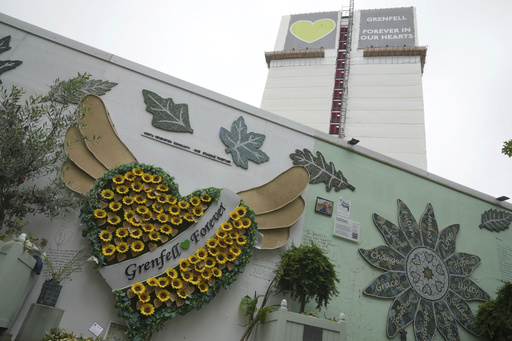Seven years following a tragic fire at a London high-rise building that claimed the lives of 72 individuals, an extensive public inquiry is anticipated to reveal the oversights and errors that transformed a minor fire in an apartment kitchen into the deadliest blaze on British land since World War II. The inquiry, led by retired judge Martin Moore-Bick, is scheduled to unveil its findings on Wednesday following a six-year investigation into the building flaws, inadequate enforcement of safety standards, and mistakes made by emergency responders that contributed to the devastating outcome of the Grenfell Tower fire.
Survivors of the fire, such as Sandra Ruiz, whose niece perished in the blaze, are eager for answers and accountability. While criminal charges are pending until after the inquiry concludes, individuals like Ruiz believe that those responsible for decisions that prioritized profit over safety should face legal repercussions. The fire erupted on June 14, 2017, in a fourth-floor apartment and quickly spread throughout the 25-story building due to flammable cladding panels on the exterior walls.
The Grenfell Tower tragedy not only shocked the nation but also highlighted issues with safety regulations and authorities’ shortcomings that led to the high number of casualties. The incident also sparked discussions on socioeconomic inequalities in Britain, as Grenfell Tower was situated in an affluent neighborhood, yet many victims were working-class individuals with diverse backgrounds. The public inquiry, initiated by the government soon after the fire, has involved over 300 public hearings and examined approximately 1,600 witness statements.
Following the fire, the UK government prohibited metal composite cladding panels in new constructions and mandated the removal of similar combustible cladding from numerous tower blocks nationwide. However, challenges remain as disputes over funding have delayed the execution of necessary safety upgrades in some buildings. The inquiry has highlighted a culture of blame-shifting among entities involved in the Grenfell Tower renovations, including cladding manufacturers, refurbishment contractors, and local authorities.
Despite ongoing investigations by the police into potential criminal charges, including corporate and individual manslaughter, legal proceedings are not expected to materialize before late 2026. Concerns have been raised by survivors and bereaved families that the forthcoming inquiry report may distribute accountability too broadly, potentially hindering the possibility of holding specific individuals or entities accountable. The Grenfell Next of Kin group expressed disappointment over the prolonged pursuit of justice following the tragic incident.


